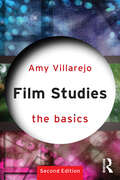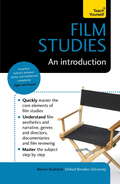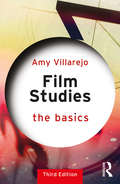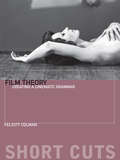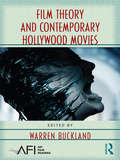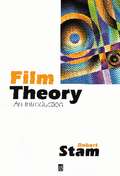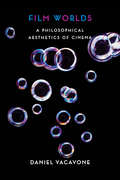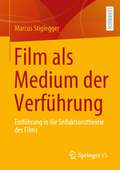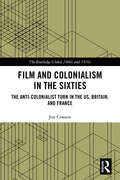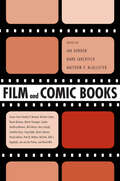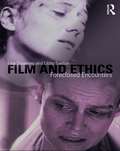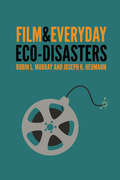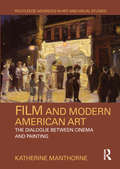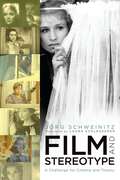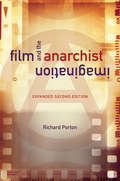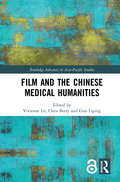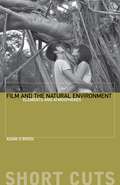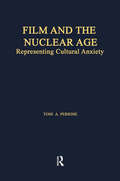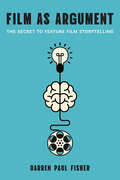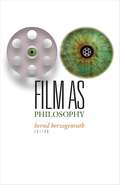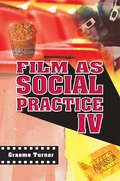- Table View
- List View
Film Studies: A Global Approach (The Basics)
by Amy VillarejoFilm Studies: The Basics is a compelling guide to the study of cinema in all its forms. This second edition has been thoroughly revised and updated to take account of recent scholarship, the latest developments in the industry and the explosive impact of new technologies. Core topics covered include: The history, technology and art of cinema Theories of stardom, genre and film-making The movie industry from Hollywood to Bollywood Who does what on a film set Complete with film stills, end-of-chapter summaries and a substantial glossary, Film Studies: The Basics is the ideal introduction to those new to the study of cinema.
Film Studies: An Introduction
by Warren BucklandAn unpretentious guide for all those who want to learn to analyse, understand and evaluate films. Film Studies: An Introduction provides an overview of the key areas in film studies, including aesthetics, narrative, genre, documentary films and the secrets of film reviewing. From Hitchcock and Tarantino to Spielberg and Bigelow, you will gain a critical understanding of legendary directors and the techniques and skills that are used to achieve cinematic effects. Whether you are a film studies student or just a film buff wanting to know more, this book will give you an invaluable insight into the exciting and incredibly fast-moving world of film. Understand Film Studies includes: Chapter 1: Film aesthetics: formalism and realism Chapter 2: Film structure: narrative and narration Chapter 3: Film authorship: the director as auteur Chapter 4: Film genres: defining the typical film Chapter 5: The non-fiction film: five types of documentary Chapter 6: The reception of film: the art and profession of film viewingfilm viewing Teach Yourself titles employ the 'Breakthrough method', which is designed specifically to overcome problems that students face. - Problem: "I find it difficult to remember what I've read."; Solution: this book includes end-of-chapter questions and summaries, and flashcards of key points available on-line and as apps - Problem: "Most books mention important other sources, but I can never find them in time."; Solution: this book includes key texts and case studies are summarised, complete with fully referenced quotes ready to use in your essay or exam. - Problem: "Lots of introductory books turn out to cover totally different topics than my course."; Solution: this book is written by a current university lecturer who understands what students are expected to know.
Film Studies: An Introduction: Teach Yourself
by Warren BucklandAn unpretentious guide for all those who want to learn to analyse, understand and evaluate films.Film Studies: An Introduction provides an overview of the key areas in film studies, including aesthetics, narrative, genre, documentary films and the secrets of film reviewing. From Hitchcock and Tarantino to Spielberg and Bigelow, you will gain a critical understanding of legendary directors and the techniques and skills that are used to achieve cinematic effects. Whether you are a film studies student or just a film buff wanting to know more, this book will give you an invaluable insight into the exciting and incredibly fast-moving world of film.Understand Film Studies includes:Chapter 1: Film aesthetics: formalism and realismChapter 2: Film structure: narrative and narrationChapter 3: Film authorship: the director as auteurChapter 4: Film genres: defining the typical filmChapter 5: The non-fiction film: five types of documentaryChapter 6: The reception of film: the art and profession of film viewing
Film Studies: The Basics (The Basics)
by Amy VillarejoA comprehensive overview of how to study film, this updated third edition provides concise and provocative summaries for approaching the language of film analysis, ways of thinking about film history, and approaches and methods for studying cinema, from national cinemas to genre to stardom and beyond. The new edition tracks the changes in film production and exhibition by situating the study of film within contemporary digital media cultures and structures, such as social media and streaming platforms. Without forsaking its emphasis on the study of film, the third edition updates its examples and provides fresh insight into today’s image culture. Film Studies: The Basics provides beginning students in film studies, as well as lifelong film buffs, with the tools to pursue film analysis, film history, and further inquiries into the medium.
Film Theory
by Felicity ColmanFilm Theory addresses the core concepts and arguments created or used by academics, critical film theorists, and filmmakers, including the work of Dudley Andrew, Raymond Bellour, Mary Ann Doane, Miriam Hansen, bell hooks, Siegfried Kracauer, Raul Ruiz, P. Adams Sitney, Bernard Stiegler, and Pier Paolo Pasolini. This volume takes the position that film theory is a form of writing that produces a unique cinematic grammar; and like all grammars, it forms part of the system of rules that govern a language, and is thus applicable to wider range of media forms. In their creation of authorial trends, identification of the technology of cinema as a creative force, and production of films as aesthetic markers, film theories contribute an epistemological resource that connects the technologies of filmmaking and film composition. This book explores these connections through film theorisations of processes of the diagrammatisation (the systems, methodologies, concepts, histories) of cinematic matters of the filmic world.
Film Theory
by Felicity ColmanFilm Theory addresses the core concepts and arguments created or used by academics, critical film theorists, and filmmakers, including the work of Dudley Andrew, Raymond Bellour, Mary Ann Doane, Miriam Hansen, bell hooks, Siegfried Kracauer, Raul Ruiz, P. Adams Sitney, Bernard Stiegler, and Pier Paolo Pasolini. This volume takes the position that film theory is a form of writing that produces a unique cinematic grammar; and like all grammars, it forms part of the system of rules that govern a language, and is thus applicable to wider range of media forms. In their creation of authorial trends, identification of the technology of cinema as a creative force, and production of films as aesthetic markers, film theories contribute an epistemological resource that connects the technologies of filmmaking and film composition. This book explores these connections through film theorisations of processes of the diagrammatisation (the systems, methodologies, concepts, histories) of cinematic matters of the filmic world.
Film Theory and Contemporary Hollywood Movies (AFI Film Readers)
by Warren BucklandFilm theory no longer gets top billing or plays a starring role in film studies today, as critics proclaim that theory is dead and we are living in a post-theory moment. While theory may be out of the limelight, it remains an essential key to understanding the full complexity of cinema, one that should not be so easily discounted or discarded. In this volume, contributors explore recent popular movies through the lens of film theory, beginning with industrial-economic analysis before moving into a predominately aesthetic and interpretive framework. The Hollywood films discussed cover a wide range from 300 to Fifty First Dates, from Brokeback Mountain to Lord of the Rings, from Spider-Man 3 to Fahrenheit 9/11, from Saw to Raiders of the Lost Ark, and much more. Individual essays consider such topics as the rules that govern new blockbuster franchises, the ‘posthumanist realism’ of digital cinema, video game adaptations, increasingly restricted stylistic norms, the spatial stories of social networks like YouTube, the mainstreaming of queer culture, and the cognitive paradox behind enjoyable viewing of traumatic events onscreen. With its cast of international film scholars, Film Theory and Contemporary Hollywood Movies demonstrates the remarkable contributions theory can offer to film studies and moviegoers alike.
Film Theory: An Introduction
by Robert StamThis book is a lively and provoking introduction to film theory. It is suitable for students from any discipline but is particularly aimed at students studying film and literature as it examines issues common to both subjects such as realism, illusionism, narration, point of view, style, semiotics, psychoanalysis and multiculturalism. It also includes coverage of theorists common to both, Barthes, Lacan and Bakhtin among others. Robert Stam, renowned for his clarity of writing, will also include studies of cinema specialists providing readers with a depth of reference not generally available outside the field of film studies itself. Other material covered includes film adaptations of works of literature and analogies between literary and film criticism.
Film Theory: Creating a Cinematic Grammar (Short Cuts)
by Felicity ColmanFilm Theory addresses the core concepts and arguments created or used by academics, critical film theorists, and filmmakers, including the work of Dudley Andrew, Raymond Bellour, Mary Ann Doane, Miriam Hansen, bell hooks, Siegfried Kracauer, Raul Ruiz, P. Adams Sitney, Bernard Stiegler, and Pier Paolo Pasolini. This volume takes the position that film theory is a form of writing that produces a unique cinematic grammar; and like all grammars, it forms part of the system of rules that govern a language, and is thus applicable to wider range of media forms. In their creation of authorial trends, identification of the technology of cinema as a creative force, and production of films as aesthetic markers, film theories contribute an epistemological resource that connects the technologies of filmmaking and film composition. This book explores these connections through film theorisations of processes of the diagrammatisation (the systems, methodologies, concepts, histories) of cinematic matters of the filmic world.
Film Worlds
by Daniel YacavoneDaniel Yacavone is Lecturer in Film Studies at the University of Edinburgh, where he has been acting director of Film Studies within the School of Literatures, Languages, and Cultures and has held a British Academy Postdoctoral Fellowship.
Film Worlds: A Philosophical Aesthetics of Cinema
by Daniel YacavoneFilm Worlds unpacks the significance of the "worlds" that narrative films create, offering an innovative perspective on cinema as art. Drawing on aesthetics and the philosophy of art in both the continental and analytic traditions, as well as classical and contemporary film theory, it weaves together multiple strands of thought and analysis to provide new understandings of filmic representation, fictionality, expression, self-reflexivity, style, and the full range of cinema's affective and symbolic dimensions.Always more than "fictional worlds" and "storyworlds" on account of cinema's perceptual, cognitive, and affective nature, film worlds are theorized as immersive and transformative artistic realities. As such, they are capable of fostering novel ways of seeing, feeling, and understanding experience. Engaging with the writings of Jean Mitry, Pier Paolo Pasolini, Christian Metz, David Bordwell, Gilles Deleuze, and Hans-Georg Gadamer, among other thinkers, Film Worlds extends Nelson Goodman's analytic account of symbolic and artistic "worldmaking" to cinema, expands on French philosopher Mikel Dufrenne's phenomenology of aesthetic experience in relation to films and their worlds, and addresses the hermeneutic dimensions of cinematic art. It emphasizes what both celluloid and digital filmmaking and viewing share with the creation and experience of all art, while at the same time recognizing what is unique to the moving image in aesthetic terms. The resulting framework reconciles central aspects of realist and formalist/neo-formalist positions in film theory while also moving beyond them and seeks to open new avenues of exploration in film studies and the philosophy of film.
Film als Medium der Verführung: Einführung in die Seduktionstheorie des Films
by Marcus StigleggerDie Seduktionstheorie definiert den Film im weiteren Sinne als ein Medium der Verführung, basierend auf dem französischen Begriff der séduction. Es handelt sich um einen von kontinentaler Philosophie und klassischer Filmtheorie geprägten theoretischen Ansatz, mit dem ein dreistufiges Analysemodell verknüpft ist. Das Buch führt in die theoretischen Grundlagen ein und stellt anhand unterschiedlicher klassischer und aktueller Beispiele aus der Filmgeschichte mögliche Analyseansätze vor.
Film and Colonialism in the Sixties: The Anti-Colonialist Turn in the US, Britain, and France (The Routledge Global 1960s and 1970s Series)
by Jon CowansRelations between Western nations and their colonial subjects changed dramatically in the second half of the twentieth century. As nearly all of the West’s colonies gained their independence by 1975, attitudes toward colonialism in the West also changed, and terms such as empire and colonialism, once used with pride, became strongly negative. While colonialism has become discredited, precisely when or how that happened remains unclear. This book explores changing Western attitudes toward colonialism and decolonization by analyzing American, British, and French popular cinema and its reception from 1960 to 1973.
Film and Comic Books
by Ian Gordon, Mark Jancovich and Matthew P. McAllisterContributions by Timothy P. Barnard, Michael Cohen, Rayna Denison, Martin Flanagan, Sophie Geoffroy-Menoux, Mel Gibson, Kerry Gough, Jonathan Gray, Craig Hight, Derek Johnson, Pascal Lefevre, Paul M. Malone, Neil Rae, Aldo J. Regalado, Jan van der Putten, and David Wilt In Film and Comic Books contributors analyze the problems of adapting one medium to another; the translation of comics aesthetics into film; audience expectations, reception, and reaction to comic book-based films; and the adaptation of films into comics. A wide range of comic/film adaptations are explored, including superheroes (Spider-Man), comic strips (Dick Tracy), realist and autobiographical comics (American Splendor; Ghost World), and photo-montage comics (Mexico's El Santo). Essayists discuss films beginning with the 1978 Superman. That success led filmmakers to adapt a multitude of comic books for the screen including Marvel's Uncanny X-Men, the Amazing Spider-Man, Blade, and the Incredible Hulk as well as alternative graphic novels such as From Hell, V for Vendetta, and Road to Perdition. Essayists also discuss recent works from Mexico, France, Germany, and Malaysia.
Film and Ethics: Foreclosed Encounters
by Lisa Downing Libby SaxtonFilm & Ethics considers a range of films and texts of film criticism alongside disparate philosophical discourses of ethics by Levinas, Derrida, Foucault, Lacanian psychoanalysts and postmodern theorists.
Film and Everyday Eco-disasters
by Robin L. Murray Joseph K. HeumannEco-disasters such as coal-mining accidents, oil spills, and food-borne diseases appear regularly in the news, making them seem nearly commonplace. These ecological crises highlight the continual tensions between human needs and the environmental impact these needs produce. Contemporary documentaries and feature films explore environmental-human conflicts by depicting the consequences of our overconsumption and dependence on nonrenewable energy.Film and Everyday Eco-disasters examines changing perspectives toward everyday eco-disasters as reflected in the work of filmmakers from the silent era forward, with an emphasis on recent films such as Dead Ahead, an HBO dramatization of the Exxon Valdez disaster; Total Recall, a science fiction action film highlighting oxygen as a commodity; The Devil Wears Prada, a comment on the fashion industry; and Food, Inc., a documentary interrogation of the food industry. The authors evaluate not only the success of these films as rhetorical arguments but also their rhetorical strategies. This interdisciplinary approach to film studies fuses cultural, economic, and literary critiques in articulating an approach to ecology that points to sustainable development as an alternative to resource exploitations and their associated everyday eco-disasters.
Film and Modern American Art: The Dialogue between Cinema and Painting (Routledge Advances in Art and Visual Studies)
by Katherine ManthorneBetween the 1890s and the 1930s, movie going became an established feature of everyday life across America. Movies constituted an enormous visual data bank and changed the way artist and public alike interpreted images. This book explores modern painting as a response to, and an appropriation of, the aesthetic possibilities pried open by cinema from its invention until the outbreak of World War II, when both the art world and the film industry changed substantially. Artists were watching movies, filmmakers studied fine arts; the membrane between media was porous, allowing for fluid exchange. Each chapter focuses on a suite of films and paintings, broken down into facets and then reassembled to elucidate the distinctive art–film nexus at successive historic moments.
Film and Stereotype: A Challenge for Cinema and Theory (Film and Culture Series)
by Jörg SchweinitzSince the early days of film, critics and theorists have contested the value of formula, cliché, conventional imagery, and recurring narrative patterns of reduced complexity in cinema. Whether it's the high-noon showdown or the last-minute rescue, a lonely woman standing in the window or two lovers saying goodbye in the rain, many films rely on scenes of stereotype, and audiences have come to expect them. Outlining a comprehensive theory of film stereotype, a device as functionally important as it is problematic to a film's narrative, Jörg Schweinitz constructs a fascinating though overlooked critical history from the 1920s to today.Drawing on theories of stereotype in linguistics, literary analysis, art history, and psychology, Schweinitz identifies the major facets of film stereotype and articulates the positions of theorists in response to the challenges posed by stereotype. He reviews the writing of Susan Sontag, Roland Barthes, Theodor W. Adorno, Rudolf Arnheim, Robert Musil, Béla Balázs, Hugo Münsterberg, and Edgar Morin, and he revives the work of less-prominent writers, such as René Fülöp-Miller and Gilbert Cohen-Séat, tracing the evolution of the discourse into a postmodern celebration of the device. Through detailed readings of specific films, Schweinitz also maps the development of models for adapting and reflecting stereotype, from early irony (Alexander Granowski) and conscious rejection (Robert Rossellini) to critical deconstruction (Robert Altman in the 1970s) and celebratory transfiguration (Sergio Leone and the Coen brothers). Altogether a provocative spectacle, Schweinitz's history reveals the role of film stereotype in shaping processes of communication and recognition, as well as its function in growing media competence in audiences beyond cinema.
Film and the Anarchist Imagination: Expanded Second Edition
by Richard PortonHailed since its initial release, Film and the Anarchist Imagination offers the authoritative account of films featuring anarchist characters and motifs. Richard Porton delves into the many ways filmmakers have portrayed anarchism’s long traditions of labor agitation and revolutionary struggle. While acknowledging cinema’s predilection for ludicrous anarchist stereotypes, he focuses on films that, wittingly or otherwise, reflect or even promote workplace resistance, anarchist pedagogy, self-emancipation, and anti-statist insurrection. Porton ranges from the silent era to the classics Zéro de Conduite and Love and Anarchy to contemporary films like The Nothing Factory while engaging the works of Jean Vigo, Jean-Luc Godard, Lina Wertmüller, Yvonne Rainer, Ken Loach, and others. For this updated second edition, Porton reflects on several new topics, including the negative portrayals of anarchism over the past twenty years and the contemporary embrace of post-anarchism.
Film and the Chinese Medical Humanities (Routledge Advances in Asia-Pacific Studies)
by Chris Berry Vivienne Lo Guo LipingFilm and the Chinese Medical Humanities is the first book to reflect on the power of film in representing medical and health discourse in China in both the past and the present, as well as in shaping its future. Drawing on both feature and documentary films from mainland China, the chapters each engage with the field of medicine through the visual arts. They cover themes such as the history of doctors and their concepts of disease and therapies, understanding the patient experience of illness and death, and establishing empathy and compassion in medical practice, as well as the HIV/AIDs epidemic during the 1980s and 90s and changing attitudes towards disability. Inherently interdisciplinary in nature, the contributors therefore provide different perspectives from the fields of history, psychiatry, film studies, anthropology, linguistics, public health and occupational therapy, as they relate to China and people who identify as Chinese. Their combined approaches are united by a passion for improving the cross-cultural understanding of the body and ultimately healthcare itself. A key resource for educators in the Medical Humanities, this book will be useful to students and scholars of Chinese Studies and Film Studies as well as global health, medical anthropology and medical history.
Film and the Natural Environment: Elements and Atmospheres (Short Cuts)
by Adam O'BrienEnvironmental themes are present in cinema more than ever before. But the relationship between film and the natural world is a long and complex one, not reducible to issues such as climate change and pollution. This volume demonstrates how an awareness of natural features and dynamics can enhance our understanding of three key film-studies topics – narrative, genre, and national cinema. It does so by drawing on examples from a broad historical and geographical spectrum, including Sunrise, A River Called Titas, and Profound Desires of the Gods. The first introductory text on a topic which has long been overlooked in the discipline, Film and the Natural Environment argues that the nonhuman world can be understood not just as a theme but as a creative resource available to all filmmakers. It invites readers to consider some of the particular strengths and weaknesses of cinema as communicator of environmental phenomena, and collates ideas and passages from a range of critics and theorists who have contributed to our understanding of moving images and the natural world.
Film and the Nuclear Age: Representing Cultural Anxiety (Studies in American Popular History and Culture)
by Toni A. PerrineFirst published in 1998. Routledge is an imprint of Taylor & Francis, an informa company. Just as we generally pay scant attention to the potential dangers of nuclear power and nuclear war, until quite recently, scholars have made limited critical attempts to understand the cultural manifestations of the nuclear status quo. Films that feature nuclear issues most often simplify and trivialize the subject. They also convey a sense of the ambivalence and anxiety that pervades cultural responses to our nuclear capability. The production of popular narrative films with nuclear topics largely conforms to periods of heightened nuclear awareness or fear, such as the fear of fallout from nuclear testing manifested in the atomic creatures in science fiction movies of the late 1950s. By their very numbers, and through a set of recurring stylistic and narrative conventions, nuclear films reflect a deep-seated cultural anxiety. This study includes detailed textual analysis of films that depict nuclear issues including the development and use of the first atomic bombs, nuclear testing and the fear of fallout, nuclear power, the Cold War arms race, "loose nukes", and future nuclear war and its aftermath.(Includes bibliographic references, index, filmography, choronology; Illustrated)
Film as Argument: The Secret to Feature Film Storytelling
by Darren Paul FisherIf you’ve picked up this book, it’s most likely that you have an interest in movies over-and-above the typical audience member. Perhaps a screenwriter, producer or director looking to improve your work, always searching for any insight that will result in better cinematic storytelling. If that’s the case, then good news: this is the book for you. It asks a deceptively straightforward question. Why do we make feature films? Is it to entertain? To move and audience? To tell a powerful story? For fame and fortune? You may have answered yes to each, but those answers don’t account for the practice overall. Most books about screenwriting and directing are primarily concerned with craft and technique, but how can you truly understand filmmaking – or make the best films - unless you know what purpose it really serves. So what’s the secret? As the title of this book suggests, making feature films is fundamentally the practice of making a very specific type of argument. To see how this works, we will deep-dive into how filmmakers are trained and taught to think about filmmaking, and what traditions they knowingly or unknowingly follow. We will look at hundreds of films and some major case studies, including Toy Story 3, Schindler’s List, Raiders of the Lost Ark, Amour, and mother!, to explore how and what films argue, and why knowing this can both unlock both a greater appreciation of the form, and improve the impact your films make.
Film as Philosophy
by Bernd HerzogenrathFilm and philosophy have much in common, and books have been written on film and philosophy. But can films be, or do, philosophy? Can they &“think&”? Film as Philosophy is the first book to explore this fascinating question historically, thematically, and methodically.Bringing together leading scholars from universities across the globe, Film as Philosophy presents major new research that leads film studies and philosophy into a productive dialogue. It provides a uniquely sweeping, historical overview of the confluence of film and philosophy for more than a century, considering films from Jean Renoir, Lars von Trier, Jørgen Leth, David Lynch, Michael Haneke, and others; the written works of filmmakers who also theorized on the medium, including Sergei Eisenstein and Jean Epstein; and others who have written on cinema, including Hugo Münsterberg, Béla Balázs, André Bazin, Henri Bergson, Gilles Deleuze, Stanley Cavell, Alain Badiou, Jacques Rancière, and many more. Representing a major step toward establishing a media philosophy that puts the status, role, and function of film into a new perspective, Film as Philosophy removes representational techniques from the center of inquiry, replacing these with the medium&’s ability to &“think.&” Hence it accords film with &“agency,&” and the dialogue between it and philosophy (and even neuroscience) is negotiated anew.Contributors: Nicole Brenez, U of Paris 3–Sorbonne; Elisabeth Bronfen, U of Zurich; Noël Carroll, CUNY; Tom Conley, Harvard U; Angela Dalle Vacche, Georgia Institute of Technology; Gregory Flaxman, U of North Carolina, Chapel Hill; Alex Ling, Western Sydney U; Adrian Martin, Monash U; John Ó Maoilearca, Kingston U, London; Robert Sinnerbrink, Macquarie U, Sydney; Murray Smith, U of Kent, Canterbury; Julia Vassilieva, Monash U, Melbourne; Christophe Wall-Romana, U of Minnesota; and Thomas E. Wartenberg, Mount Holyoke College.
Film as Social Practice
by Graeme TurnerThis fourth edition of our bestselling text has been comprehensively updated and revised to include contemporary film analysis and recent films. With a focus on contemporary popular cinema and examples from Classical Hollywood, Graeme Turner examines the social and cultural aspects of film from audiences and ideologies to exhibition and technology. This fourth edition now includes: new sections dealing with debates about spectacle and special effects an extended treatment of sound and its contribution to cinema film theory’s discussion of the representation of race and ethnicity a thorough update of individual film references a revised applications chapter that includes new contemporary examples new illustrations from contemporary popular cinema. Students of film studies, film practice and film theory will find this a welcome addition to their degree course studies.
